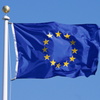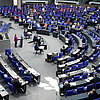The European Medical Corps launched
15 February 2016. Today, the European Medical Corps (EU Med Corps), a team of experts for cross-border health crises, was launched in Brussels. The Corps includes experts from the Robert Koch Institute as well as a mobile laboratory from the Bernhard Nocht Institute of Tropical Medicine.
The purpose of the EU Med Corps, a team of experts for rapid deployment in cross-border health crises, is to be able to intervene on the ground at the very first sign of a disease outbreak. It brings together specialists from the areas of medicine, health services and logistics while making available highly modern mobile facilities. Among those participating are the Public Health experts of the Robert Koch Institute, one of the agencies under the Federal Ministry of Health. A mobile laboratory will be made available by the Bernhard Nocht Institute of Tropical Medicine.
The Federal Minister of Health, Hermann Gröhe, had announced these measures at the EU conference "Ebola – lessons learned" on 12th October 2015 in Luxembourg. They are part of a program conducted by the Federal Ministry of Health that was launched this year with a budget of 4 million euros and is scheduled to run for five years. It additionally involves the training of personnel in the management of health crises.
EU Med Corps – reaction to the Ebola epidemic
With the aid of its expertise and infrastructure, the EU Med Corps is now intended to provide additional support to the World Health Organisation's Global Health Emergency Workforce. Currently, eight other EU states are participating in the program alongside Germany: Belgium, Czech Republic, Finland, France, Luxembourg, the Netherlands, Spain and Sweden. As part of the European Response Capacity, which coordinates multidisciplinary teams of civil protection personnel, the European Medical Corps fits seamlessly into existing structures.
The idea of creating the expert team for cross-border health crises stemmed from the 2014 Ebola outbreak in West Africa, the toll of which was over 11,000 lives. In order to be better prepared for future disease outbreaks, external assistance must be supplemented by robust healthcare structures in the affected countries. It was with this in mind that, last year, the seven leading industrial nations (G7) committed, among other measures, to assisting other states in the implementation of the International Health Regulations. In the meantime, 76 states, including three regional associations have made similar commitments. Additional countries are likely to join.
Additional information
-
G7 support to 76 countries
Article about G7 pledging to support 76 countries worldwide in strengthening their health care system
-
G7 Summit
Article about the G7 Summit
-
Lessons learned from the Ebola crisis
Article about measurements to improve international health crisis respnse efforts




























